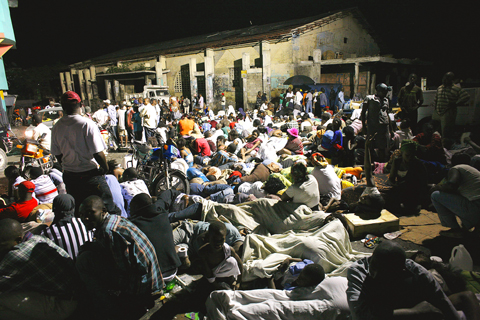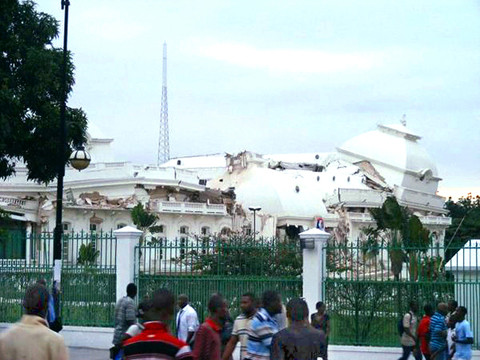World governments and aid agencies mobilized emergency rescue teams and supplies for Haiti yesterday after a massive 7.0 earthquake that flattened buildings, with hundreds feared dead.
US President Barack Obama said his country stood “ready to assist” the impoverished Caribbean nation and authorities had begun assessing requirements.
“We are closely monitoring the situation and we stand ready to assist the people of Haiti,” Obama said.

PHOTO: REUTERS
In Miami, the US Coast Guard said it had “mobilized cutters and aircraft to positions in close proximity to Haiti to render humanitarian assistance as needed.”
USAID, the government aid agency, said it was dispatching a Disaster Assistance Response Team along with a search-and-rescue team of at least 72 personnel and six rescue dogs.
In Britain, a government humanitarian assessment team geared up to fly out to the island state as Prime Minister Gordon Brown said he was “ready to provide whatever humanitarian assistance is required.”

PHOTO: AFP
A Department for International Development (DFID) spokesman said they were “deeply concerned,” with the Haitian government and humanitarian agencies still unable to give a clear picture of their needs.
“It appears to have been severe, causing considerable damage and harm,” he said. “Overnight we have mobilized a DFID humanitarian assessment team to fly to Haiti today.”
Aid agency Oxfam said it had emergency response teams in the region poised to respond.
“At this stage it is too early to tell the severity of the earthquake in Haiti, but the early signs are not good, with communications down across the country,” said Jane Cocking, the charity’s humanitarian director.
“Oxfam has its emergency response team for Latin America based in Haiti, so we are well prepared, with a public health, water and sanitation team in Port-au-Prince ready to respond.”
The international Red Cross said in Geneva it had it had unlocked emergency funds and was mobilizing relief supplies.
“Emergency stocks are prepositioned in Haiti and will allow us to bring aid to 3,000 families for three to four days,” International Federation of the Red Cross and Red Crescent Societies spokesman Jean-Luc Martinage said.
“But we’ll have to swiftly bring relief supplies from our regional disaster response center based in Panama,” he said.
The most urgent needs were search and rescue teams, field hospitals, emergency health and shelter, water and logistics and telecommunications, he said.
The UN’s World Food Programme (WFP) said it would send planes with emergency food aid from El Salvador and Panama.
“Food is of vital importance, especially after the second or third days,” WFP spokesman for Latin America and the Caribbean, Alejandro Lopez-Chicheri, told Spanish public radio from Panama.
France said it would dispatch within hours plane-loads of rescue staff and humanitarian aid from its territories of Martinique and Guadaloupe, as well as from France.
Around 130 French emergency staff should arrive in the capital Port-au-Prince within 24 hours, the interior ministry said. Italy also prepared a transport plane to carry in a field hospital and emergency medical team.
The Netherlands immediately released 2 million euros (US$2.9 million) in aid and said it was looking into the possibility of sending rescue teams.
“The gravity of the situation seems to be like that in Southeast Asia after the tsunami in 2004,” Cooperation and Development Minister Bert Koenders said.
Germany offered 1 million euros in immediate humanitarian aid and said it was also looking into other ways that it could help.
Canada said it was identifying the humanitarian needs and Japan said it was gathering information to prepare for an intervention.
A host of other countries, including Australia, Colombia, Venezuela and Mexico, said they were also prepared to despatch help.
As the massive relief efforts mobilized, Pope Benedict XVI urged a generous response to the “tragic situation.”
“I appeal to the generosity of all to ensure our concrete solidarity and the effective support of the international community for these brothers and sisters who are living a time of need and suffering,” he said at a general audience.

POLITICAL PRISONERS VS DEPORTEES: Venezuela’s prosecutor’s office slammed the call by El Salvador’s leader, accusing him of crimes against humanity Salvadoran President Nayib Bukele on Sunday proposed carrying out a prisoner swap with Venezuela, suggesting he would exchange Venezuelan deportees from the US his government has kept imprisoned for what he called “political prisoners” in Venezuela. In a post on X, directed at Venezuelan President Nicolas Maduro, Bukele listed off a number of family members of high-level opposition figures in Venezuela, journalists and activists detained during the South American government’s electoral crackdown last year. “The only reason they are imprisoned is for having opposed you and your electoral fraud,” he wrote to Maduro. “However, I want to propose a humanitarian agreement that

ECONOMIC WORRIES: The ruling PAP faces voters amid concerns that the city-state faces the possibility of a recession and job losses amid Washington’s tariffs Singapore yesterday finalized contestants for its general election on Saturday next week, with the ruling People’s Action Party (PAP) fielding 32 new candidates in the biggest refresh of the party that has ruled the city-state since independence in 1965. The move follows a pledge by Singaporean Prime Minister Lawrence Wong (黃循財), who took office last year and assumed the PAP leadership, to “bring in new blood, new ideas and new energy” to steer the country of 6 million people. His latest shake-up beats that of predecessors Lee Hsien Loong (李顯龍) and Goh Chok Tong (吳作棟), who replaced 24 and 11 politicians respectively

Young women standing idly around a park in Tokyo’s west suggest that a giant statue of Godzilla is not the only attraction for a record number of foreign tourists. Their faces lit by the cold glow of their phones, the women lining Okubo Park are evidence that sex tourism has developed as a dark flipside to the bustling Kabukicho nightlife district. Increasing numbers of foreign men are flocking to the area after seeing videos on social media. One of the women said that the area near Kabukicho, where Godzilla rumbles and belches smoke atop a cinema, has become a “real

‘POINT OF NO RETURN’: The Caribbean nation needs increased international funding and support for a multinational force to help police tackle expanding gang violence The top UN official in Haiti on Monday sounded an alarm to the UN Security Council that escalating gang violence is liable to lead the Caribbean nation to “a point of no return.” Special Representative of the UN Secretary-General for Haiti Maria Isabel Salvador said that “Haiti could face total chaos” without increased funding and support for the operation of the Kenya-led multinational force helping Haiti’s police to tackle the gangs’ expanding violence into areas beyond the capital, Port-Au-Prince. Most recently, gangs seized the city of Mirebalais in central Haiti, and during the attack more than 500 prisoners were freed, she said.